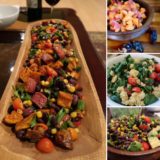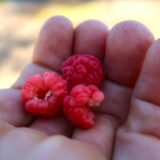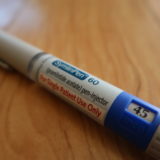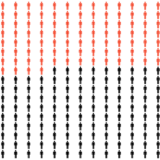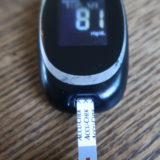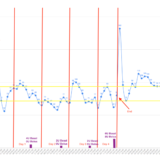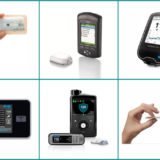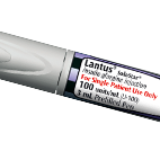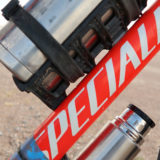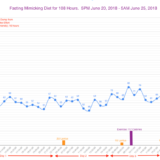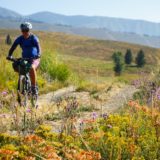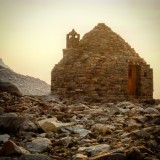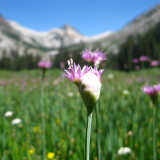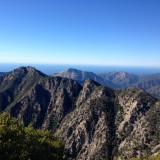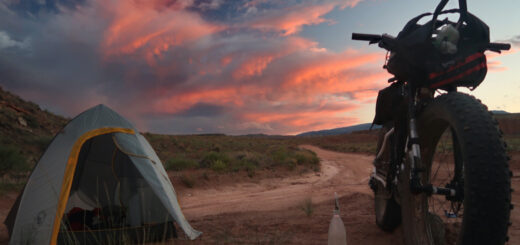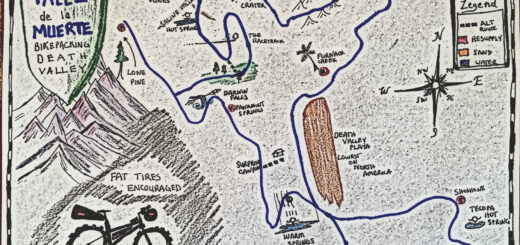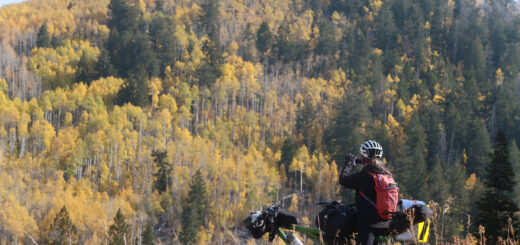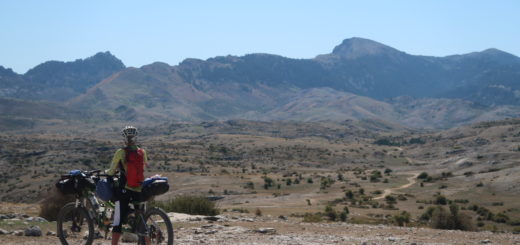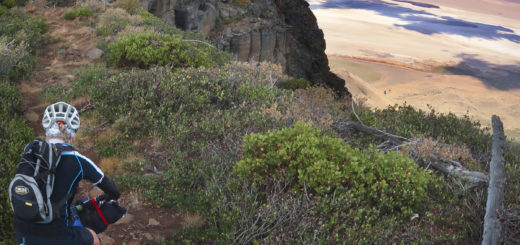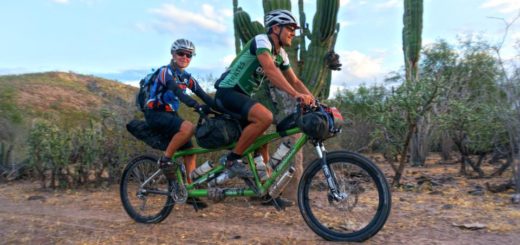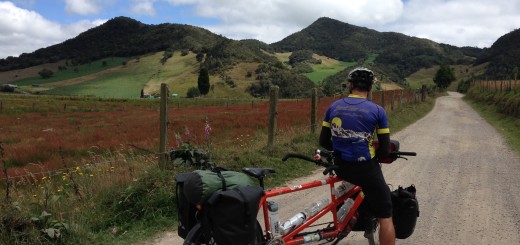12/11/2023 Bikepacking Mauritania Day 125 : Atar to Tidjikja Part 3 of 4
It was still dark when I woke. The fabric began flapping louder in the Harmattan winds. The Harmattan winds blow over Western Africa during the dry season, and are sometimes called “doctor winds” due to the damage that the 5% humidity and particulates can do to your health. It produces a dust cloud that extends out into the ocean and can be seen from satellite.
I needed to eat early because my blood sugar was too low, so I turned on my headlamp and began to spread margarine onto some bread that I had packed.
Rashid was awake now and he squatted near me. I could barely see him in the dim LED light. I offered him my bread and margarine, and he made a little butter sandwich. I told him I was very grateful for his hospitality.
“I am Muslim. It is my duty to help others”
Does that sound familiar? I’ve posted it at least once before, but whenever I have said thank you for something big, people always reply that it is their “duty”. For my non-Muslim readers, when you help others, why do you do it? Where do you feel that urge comes from? Is it out of a sense of duty? Maybe it is just semantics, but duty makes it seem like an obligation, whereas I feel like my desire to help comes from somewhere else.
It was time to say goodbye. The winds outside were still raging, but everyone had agreed that there were tiny villages and tents - not on any map - where I could get water and take cover. If I hid from the wind another day, I’d be leaving Janet hanging without notification even longer. There were still 180 miles to go before I would have any communication with the outside world. Remember, this was “Route C” with no prior information, except a satellite image showing 30 percent of the route buried in sand. Everyone promised that the road was open.
I remember learning as a kid that when you meet someone, you should stand up as a sign of respect. Somewhere, in the back of my head, if someone stays on the floor to shake you hand it “feels” disrespectful. I said goodby to a few people lying on the floor; in their culture, I don’t think this means disrespect. I bought some more sardines and bread, and said goodbye to the omni-smiling and giggling uncle. He was my favorite one here.
As I pushed hard into the wind, I noticed something was different. The Achilles pain was suddenly 5 percent of maximum instead of the 80 percent it had been last few weeks. How had it healed overnight? I don’t think it was the camel milk (which by the way did not cure my diabetes). It could be due to me trying to emulate the contorted postures of my tent companions. I noticed yesterday that when people sit, they tangle their skinny legs up into such odd positions; as if they are doing yoga on their floor. Often, they will bend their hands backwards (farther than I can do), their palms easily making a 90 degree angle with their forearm. As I copied them, and listened to their conversation, I would massage my Achilles. This morning, the lump was gone and the pain almost entirely vanished. I could finally pedal harder now - and strong cycling would be necessary.
As I set off this morning, a Mercedes drove past me. It would be the one and ONLY car that passed me “going my way” during this 10 hour ride. Let that sink in for a moment. Why does this road that you could ride on a road bike even exist if so few use it?
I guess it is how supplies are trucked in, but apparently nothing comes in on a Monday. At the little store yesterday, I was able to find the same food seen everywhere else: Candy, bread, margerine, dates, sardines, tea, water, rancid peanuts, sugar, and cigarettes. If I had a stove, the remaining options are macaroni, shriveled carrots, tomatoes, and Mother Hubbard Squash. If you put all the options together, it’s complete nutrition. I don’t know where the little piece of fish in yesterday’s grab-plate came from, but it had bones like the fish in a Tom and Jerry cartoon meaning it wasn’t from a can of sardines.
Margarine seems to be the only concentrated source of fat I can find. It is probably unfit for human consumption right off the shelf, but after it melts into a bag in the desert heat and re-solidifies during the night, it certainly converts into something toxic.
As a fat adapted athlete, I am having trouble finding the fuel I am used to; fat is in scarce supply, which is why I buy margarine when I see it. I’ve been buying bread to make up for the shortfall in calories; It’s yet another thing from home that I am having to “let go.” Mid-day, I felt that awful margarine nausea coming on. Because this is the 3rd time I’ve felt this way, the cause was obvious: the margarine becomes rancid when it melts. I poured the golden oil from my bag into the desert sand. Luckily, I didn’t throw up this time, but had hypoglycemia again with the nausea.
It was a day of hard pedaling into the wind, but finally at around 4:30 PM, the wind slowed to a reasonable ~12mph. It seemed like the majority of my progress was made in those last hours of the day.
As it got darker, a substantial building appeared on the horizon. I set my tent on windward side of building (hidden from the road, otherwise I would have preferred the leeward side). Tent people saw me, and within 30 minutes came to check it out. They sent some kids to fetch the village chief. He arrived in his clean white robe with two golden stripes, inspecting the situation. One of the smiling teenagers ebulliently pointed at their own tents and made the sleeping symbol. I think he really wanted a sleepover party. I was so exhausted from last night (the regurgitation, not the people) that I kept doing sign language indicating I would rather stay here. Plus, I had spent so much time battening down the tent. I had even put rocks inside all around the edges to bolster it against the wind. It would be a lot of work to dismantle. The chief gave his approval, and the “interpreter” gave me a “thumbs up” and a smile, meaning I could stay. It was all very pleasant with their smiles. The only intelligible words exchanged between us were, “c’est bon” and “shukraan lak” (thank you). I decided to adopt the hand-clasping handshake from the woman in the Bedouin tent yesterday as I went around to thank each one.
The wind remained relatively calm for the next 8 hours of night. It concerned me that Janet would be worried after 3 days without communication, and today’s effort had taken so much out of me that the idea of doing the remaining 70 miles to cell service in just one day seemed formidable. I knew I had to push, but I was frankly loving being off-grid in the desert… in spite of the physical hardship.
I needed to eat early because my blood sugar was too low, so I turned on my headlamp and began to spread margarine onto some bread that I had packed.
Rashid was awake now and he squatted near me. I could barely see him in the dim LED light. I offered him my bread and margarine, and he made a little butter sandwich. I told him I was very grateful for his hospitality.
“I am Muslim. It is my duty to help others”
Does that sound familiar? I’ve posted it at least once before, but whenever I have said thank you for something big, people always reply that it is their “duty”. For my non-Muslim readers, when you help others, why do you do it? Where do you feel that urge comes from? Is it out of a sense of duty? Maybe it is just semantics, but duty makes it seem like an obligation, whereas I feel like my desire to help comes from somewhere else.
It was time to say goodbye. The winds outside were still raging, but everyone had agreed that there were tiny villages and tents - not on any map - where I could get water and take cover. If I hid from the wind another day, I’d be leaving Janet hanging without notification even longer. There were still 180 miles to go before I would have any communication with the outside world. Remember, this was “Route C” with no prior information, except a satellite image showing 30 percent of the route buried in sand. Everyone promised that the road was open.
I remember learning as a kid that when you meet someone, you should stand up as a sign of respect. Somewhere, in the back of my head, if someone stays on the floor to shake you hand it “feels” disrespectful. I said goodby to a few people lying on the floor; in their culture, I don’t think this means disrespect. I bought some more sardines and bread, and said goodbye to the omni-smiling and giggling uncle. He was my favorite one here.
As I pushed hard into the wind, I noticed something was different. The Achilles pain was suddenly 5 percent of maximum instead of the 80 percent it had been last few weeks. How had it healed overnight? I don’t think it was the camel milk (which by the way did not cure my diabetes). It could be due to me trying to emulate the contorted postures of my tent companions. I noticed yesterday that when people sit, they tangle their skinny legs up into such odd positions; as if they are doing yoga on their floor. Often, they will bend their hands backwards (farther than I can do), their palms easily making a 90 degree angle with their forearm. As I copied them, and listened to their conversation, I would massage my Achilles. This morning, the lump was gone and the pain almost entirely vanished. I could finally pedal harder now - and strong cycling would be necessary.
As I set off this morning, a Mercedes drove past me. It would be the one and ONLY car that passed me “going my way” during this 10 hour ride. Let that sink in for a moment. Why does this road that you could ride on a road bike even exist if so few use it?
I guess it is how supplies are trucked in, but apparently nothing comes in on a Monday. At the little store yesterday, I was able to find the same food seen everywhere else: Candy, bread, margerine, dates, sardines, tea, water, rancid peanuts, sugar, and cigarettes. If I had a stove, the remaining options are macaroni, shriveled carrots, tomatoes, and Mother Hubbard Squash. If you put all the options together, it’s complete nutrition. I don’t know where the little piece of fish in yesterday’s grab-plate came from, but it had bones like the fish in a Tom and Jerry cartoon meaning it wasn’t from a can of sardines.
Margarine seems to be the only concentrated source of fat I can find. It is probably unfit for human consumption right off the shelf, but after it melts into a bag in the desert heat and re-solidifies during the night, it certainly converts into something toxic.
As a fat adapted athlete, I am having trouble finding the fuel I am used to; fat is in scarce supply, which is why I buy margarine when I see it. I’ve been buying bread to make up for the shortfall in calories; It’s yet another thing from home that I am having to “let go.” Mid-day, I felt that awful margarine nausea coming on. Because this is the 3rd time I’ve felt this way, the cause was obvious: the margarine becomes rancid when it melts. I poured the golden oil from my bag into the desert sand. Luckily, I didn’t throw up this time, but had hypoglycemia again with the nausea.
It was a day of hard pedaling into the wind, but finally at around 4:30 PM, the wind slowed to a reasonable ~12mph. It seemed like the majority of my progress was made in those last hours of the day.
As it got darker, a substantial building appeared on the horizon. I set my tent on windward side of building (hidden from the road, otherwise I would have preferred the leeward side). Tent people saw me, and within 30 minutes came to check it out. They sent some kids to fetch the village chief. He arrived in his clean white robe with two golden stripes, inspecting the situation. One of the smiling teenagers ebulliently pointed at their own tents and made the sleeping symbol. I think he really wanted a sleepover party. I was so exhausted from last night (the regurgitation, not the people) that I kept doing sign language indicating I would rather stay here. Plus, I had spent so much time battening down the tent. I had even put rocks inside all around the edges to bolster it against the wind. It would be a lot of work to dismantle. The chief gave his approval, and the “interpreter” gave me a “thumbs up” and a smile, meaning I could stay. It was all very pleasant with their smiles. The only intelligible words exchanged between us were, “c’est bon” and “shukraan lak” (thank you). I decided to adopt the hand-clasping handshake from the woman in the Bedouin tent yesterday as I went around to thank each one.
The wind remained relatively calm for the next 8 hours of night. It concerned me that Janet would be worried after 3 days without communication, and today’s effort had taken so much out of me that the idea of doing the remaining 70 miles to cell service in just one day seemed formidable. I knew I had to push, but I was frankly loving being off-grid in the desert… in spite of the physical hardship.
Photos:

Another little village. They usually look abandoned, but if you stop and look carefully, you can see people walking hunched into the wind.


The view from where I slept.

This route actually does have a lot of good scenery. Lots of rock formations - close and afar. Unfortunately, I couldn’t see much of it. I’m documenting this route, though, so other cyclists know it is possible to ride. If you somehow manage to find a 4 day window of still air, it has the potential to be one of the best rides you’ve done in your life. My experience is probably more typical (at least during the cool dry season). The winds seem to blow constantly, ruining the view, and slowing you down immensely if you are traveling from North to South.
💨

Like trees that have moss on the North facing side, the painted poles indicate the prevailing wind direction. From the East. You can see how the sand has etched away the paint.
💨

My entire diabetes kit is being destroyed by the grit. My needles plug after the first use. I can no longer use the pens as intended. I must draw up with my larger bore syringe. That too is clogged, so before each use, I must work to unclog it. The meter port must be constantly blown out. The finger stabber needs to be banged on a rock each time so the spring will retract for another use. I think about a Type 1 child here. Even if they could surmount the cost of 1 days worth of diabetes supplies, how would they ever get it to work? Sorry if this saddens you, but for a child here, I think death is the only possible outcome for a child diagnosed here.
💀

As the winds slowed, the air cleared a bit for some photography.
🌬️




Camp behind the wall!
Strava Comments:
Janet W.
Thank you for your concern about me being worried on your long desert crossing. Even though I knew you were fine, I did worry a little - because it was a long way with no internet and strong winds. I was happy to text with a few friends who were thinking about you. So glad your achilles is feeling better! I hope it still is. More massage sounds like a good treatment. The desert and it's people are full of stories and beauty.
Mark G.
Using my "Where is Brian" link I had fun checking and combining it with Google Earth to explore. "Do unto others as...." is kind of like a kind of duty/commandment. For me...being helpful is just joyful and healthy for all. Yes, we were all a bit (not yet worried, but )wondering your whereabouts. Now..... another person would be a different story. BTW have you had enough suffering yet?😂. Is Nirvana close by? BTW#2 I thought the Bicy had a satellite connection, just wondering.
Brian L.
Mark Glenesk - I had to get a new Bivy after New Zealand (maybe rain?). So I started this trip with a new one. It broke after one day of use. I had Bivy ship a replacement to Morocco at great expense, but they forgot to put my name on it. Because of that, I could not pay the customs fees. It would have cost another hundred plus dollars to put my name on the shipment and I would have had to go to the type of city I’m trying avoid and wait a few weeks for the name transfer to complete. So I am carrying a broken Bivy all across Africa to get replaced under warranty when I get home.
Brian L.
Also, Mark… that map with the points is my own creation - set up so I can send it points with my bivy or my phone. I use the phone to send points when there are cell towers, and bivy (when working) to send points when there is no cellular. I knew I was going into a remote area, and should have announced that it could be a few days. I would have gotten it done it in a day and a half; no one in the +8 time zone would have noticed one delayed post. But, with the wind, it took four days…
Mark G.
.....ah yes I remember the Bivy story now. Knowing the location and knowing you; no worries except waiting for my next installment of the grand adventure.
Ann L.
Great news about your Achilles feeling better. I bet the rest, massage and “yoga” like stretches all helped. That is sad about the diabetes and kids. You are probably right. I don’t see how they would survive, it’s so difficult for you with your own supplies to manage your diabetes there. Yuck about the margarine. That is a real dilemma about getting good fat to eat.
Janet Wagner was being brave about not hearing from you. She knows you are a survivor. It’s great to know you are experiencing such fascinating stuff.
J&K S.
Have you got a sense for what these folks in the countryside do for a living? Some are likely raising goats, camels, etc. Some are likely farming (we saw the irrigation infrastructure). Some are merchants, selling food & supplies.
A lot of people have a lot of time on their hands, though I suspect having a special visitor like you changes their routine a lot. And I've understood that hospitality is an important cultural and religious feature of Islamic countries, so your experience rings true to me.
Have you seen any evidence of a formal source of "employment" anywhere in the countryside?
Brian L.
J&K Shaw - excellent questions. For a living, the people have goats that roam amongst the tents. These have some monetary value, as does their milk. Also, there was some date growing in the oasis; dates travel better than milk. but remember that both require transport to a city to make any money. I think the best way to think of it is not from an income perspective, but instead from an outlay perspective. The people have almost no expenses. They live in tents made from salvaged materials. They don’t have cell phones; if they did, they wouldn’t work. There is no electricity bill, car payment or tv. The only expenses are food, and if you eat certain foods, that is minimal. If you don’t work and don’t exercise, you hardly need any food. I should emphasize that the only person who changed his daily routine was “Rashid.” This was not a special visitor day. I saw the same behavior in each village - and even in the more connected places; people spend the majority of their time sitting around, and going back and forth between prayer. Im glad you asked these questions because I think that maybe I should explain that aspect better to convey the realities here. The people with a shop have the most money. They are almost like bankers because that is the only place where money goes within the village. Usually tiny amounts for candy and carbs. The little vehicular traffic I saw was pickup trucks packed with goats. So this must be how money comes into the little village; they sell their goats. There seemed to be a little camel herding as well; I have seen camels tied down to trucks - but not on this stretch. The milk is sold in towns. It’s not much income, but enough to subsist.
Sօʀƈɛʀɛʀ 🅅.
Always interesting. It's Xmas Day here for me and I'm trying to catch up on your peregrinations Brian, but I'm afraid I will have to pause here for now so as to get on with things here. Humanity makes sense sometimes, and the rest of the time it doesn't. I hope you are still feeling better with that nagging achilles. Camel milk, wellness in a cup, that could be a profitable health enterprise in the USA! That is sarcasm, a little. As for the dusty fly infested hut yoga I concur. The last couple of months I've been using the time that I spend using an electric toothbrush, twice daily, squatting like a SE Asian denizen to stretch and strengthen and improve posture because I saw enough videos on YouTube to convince me to give it a try, and the toothbrush time gave me that opportunity daily. Well I can't say if it really helps but so far it hasn't hurt and I'm am getting very comfortable with it - at which point does it become unhealthy? Anyway, as one spending occasional time in a tent it is important to be able to live in a small space and have the body feel okay with it. The other night we watched a movie called LEAVE THE WORLD BEHIND, which apparently was produced in part by former president Barach Obama, in which a small part had a drone which dropped thousands of red Muslim sheets of paper propaganda on Long Island NY. The Arabic script wasn't translated for us in the movie which leaves the television audience like me homework, ie internet search to figure it out. Upshot - psyop. As Allah wishes it. Ciao
Ride Stats:
| Elapsed Time | Moving Time | Distance | Average Speed | Max Speed | Elevation Gain | Calories Burned |
|---|---|---|---|---|---|---|
|
10:02:01
hours
|
08:04:41
hours
|
153.98
km
|
19.06
km/h
|
53.48
km/h
|
2,101.00
meters
|
3,960
kcal
|







